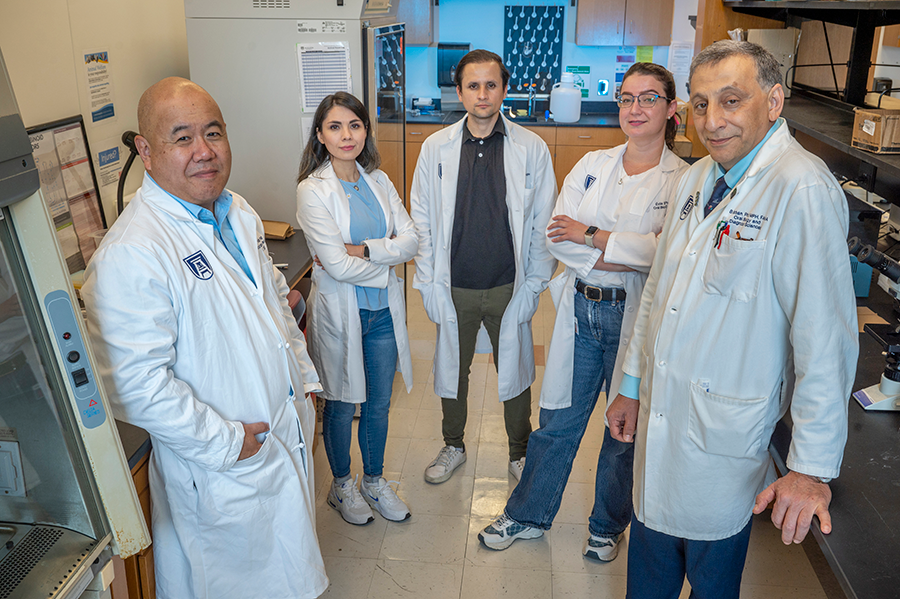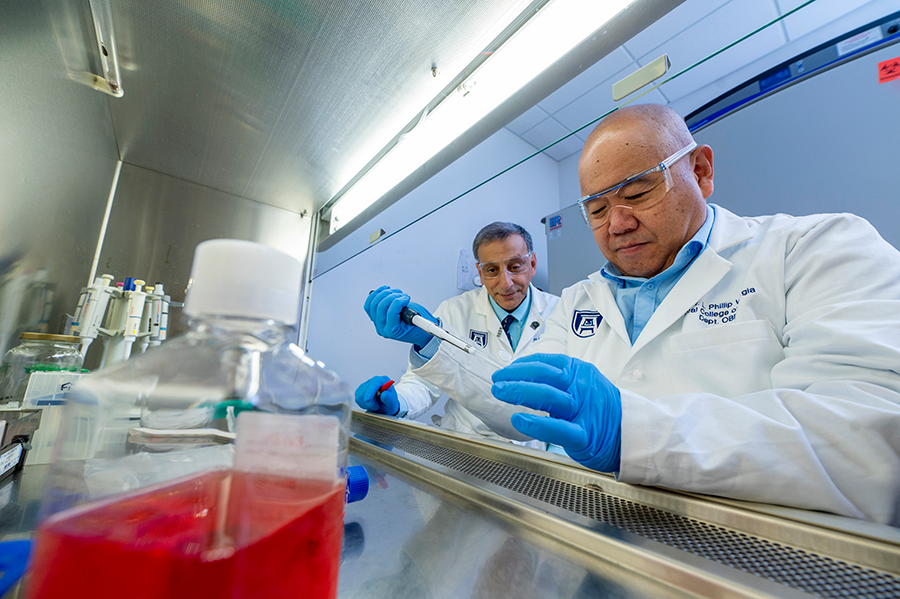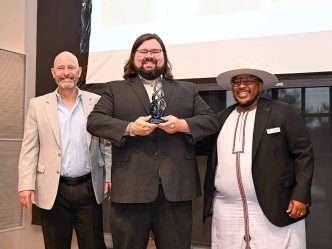Researchers at Augusta University have identified a new method to treat fentanyl addiction using a cannabidiol, or CBD, based therapy. The new research, which was published in “Cannabidiol reverses fentanyl-induced addiction and modulates neuroinflammation” by Cold Spring Harbor Laboratory’s bioRxiv, offers a promising alternative approach to combat the opioid epidemic, which has claimed hundreds of thousands of American lives.
Babak Baban, PhD, a neural immunologist and associate dean of research at AU’s Dental College of Georgia, has pioneered medical use of CBD. Baban partnered with Phillip Wang, PhD, a neuroscientist in the Medical College of Georgia’s Department of Neurology, to co-lead the collaborative research efforts to shed new light on effective treatments for fentanyl addiction.
According to the Centers for Disease Control and Prevention and the United States Drug Enforcement Administration, the United States is facing an opioid epidemic that claimed the lives of over 645,000 Americans between 1999 and 2021. Nearly 250,000 Americans have died from opioid overdose since 2018.
At the center of the opioid epidemic is fentanyl.
Fentanyl is a synthetic drug that was first developed in 1959 and introduced in the 1960s as an analgesic and anesthetic to provide pain relief. It is estimated to be approximately 100 times more potent than morphine and 50 times more potent than heroin. Just 2 milligrams of fentanyl can kill a human. Fentanyl can become even more dangerous when mixed with other drugs in its powder form, primarily cocaine and methamphetamine.
“Our method is not only effective but also easily applicable, enabling individuals to navigate their journey to recovery safely and with minimal supervision. This is a vital step in addressing the broader social and health impacts of this pervasive issue.”
Babak Baban, PhD
When studying a mouse model of fentanyl addiction, the AU team found that fentanyl use dramatically elevated neural inflammation and significantly changed innate lymphoid cells (ILCs), part of the innate immunity in the brain. With mounting evidence implicating neural inflammation and ILCs in maintaining and modulating the functions of the central nervous system (CNS), this led them to hypothesize that altered CNS immune systems may also be crucial in fentanyl induced maladaptation.
Baban and Wang have shown previously that CBD can reduce neural inflammation restore changes in ILCs, so they decided to apply a similar approach to fentanyl addiction. Through their research, they found CBD treatment significantly reversed both the elevated neural inflammation and many addiction-related behaviors.
“With most labs focusing mainly on the neuronal and synaptic plasticity mechanisms of fentanyl addiction, the association between changes in neural inflammation, especially ILCs and addiction, is somewhat surprising and very interesting,” said Wang. “This study helps to improve our understanding of the pathophysiological mechanisms subserving drug addiction. There is clearly a lot to be learned how inflammation and ILCs interact with learning and memory at behavioral level, with neural plasticity at the synaptic and neural network level, and with the reward pathways at the anatomical level.”

Traditional therapies for fentanyl addiction target and try to normalize the opiate receptor-dependent signaling that fentanyl alters. In addition to the medications, the therapies also are required to be used in conjunction with appropriate psychosocial treatments.
In their groundbreaking study, Baban and Wang identified a strong link between addiction and inflammation, postulating that heightened inflammation may contribute significantly to the development of addiction. Drawing from this critical insight, they tested the efficacy of a CBD-based mixture, specifically formulated to reduce inflammation, in mitigating fentanyl addiction in a mouse model.
“This study helps to improve our understanding of the pathophysiological mechanisms subserving drug addiction. There is clearly a lot to be learned how inflammation and ILCs interact with learning and memory at behavioral level, with neural plasticity at the synaptic and neural network level, and with the reward pathways at the anatomical level.”
Phillip Wang, PhD
Compared to traditional therapies, the CBD treatment exhibited a significantly safer profile, requiring less professional supervision, thereby potentially making it a viable solution for rural areas. Baban and Wang emphasize the importance of further patient studies to validate and refine their findings before translating them into effective clinical treatments.
“Our method is not only effective but also easily applicable, enabling individuals to navigate their journey to recovery safely and with minimal supervision,” said Baban. “This is a vital step in addressing the broader social and health impacts of this pervasive issue. We are very excited that our serendipitous finding can help solve fentanyl addiction, which has really become a global health crisis, and we are glad that this offers hope for relief at both individual and societal levels.”

Baban and Wang were joined on the study by co-first authors Bidhan Bhandari, a research assistant at AU, and Henrique Chagas, a visiting research assistant, as well as Sahar Emami Naeini, MD, and Évila Lopes Salles, DSC, both faculty of DCG’s Department of Oral Biology and Diagnostic Sciences.
Their work aligns with previous successes, such as their 2023 study published in Human Cell, which demonstrated the efficacy of inhalant CBD in treating lung cancer.
Baban and Wang are co-founders of Medicinal Cannabis of Georgia, LLC, an Augusta-based biomedical research and development company. Along with a team comprised of researchers from Augusta University and Thriftmaster Holding Group, Baban and Wang have yielded a transformative discovery that holds the promise of improving the lives of hundreds of thousands affected by fentanyl addiction.
Discoveries at Augusta University are changing and improving the lives of people in Georgia and beyond. Your partnership and support are invaluable as we work to expand our impact.
 Augusta University
Augusta University




